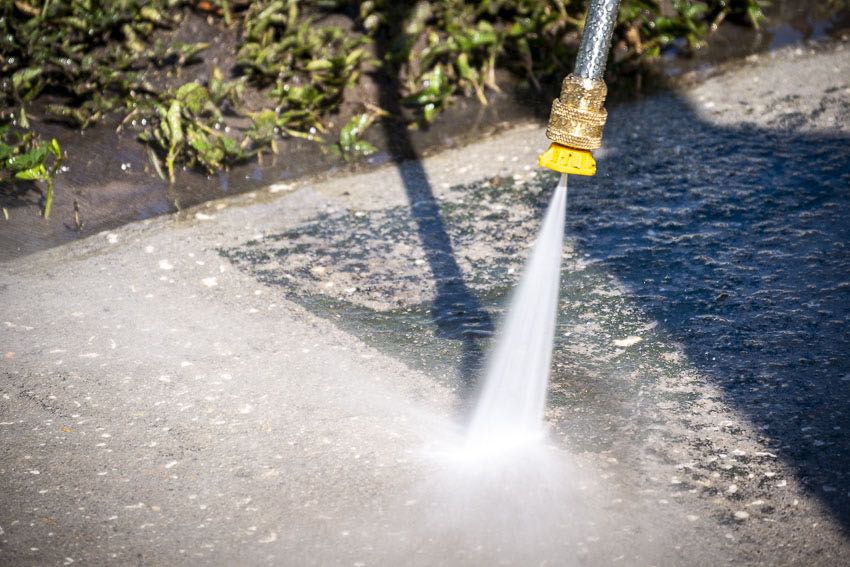There’s a lot that goes into making a pressure washer a quality pressure washer. With an array of choices like different PSI ratings, motors, and additional features, selecting the best pressure washer for your needs involves navigating a veritable galaxy of models.
That’s why we did the research, putting a wide sample of options to the test to help guide you in your quest for the right pressure washer. As such, we feel the following represent the best pressure washers for 2023.
Best Gas Pressure Washer Overall
Simpson SuperPro Roll Cage Pressure Washers
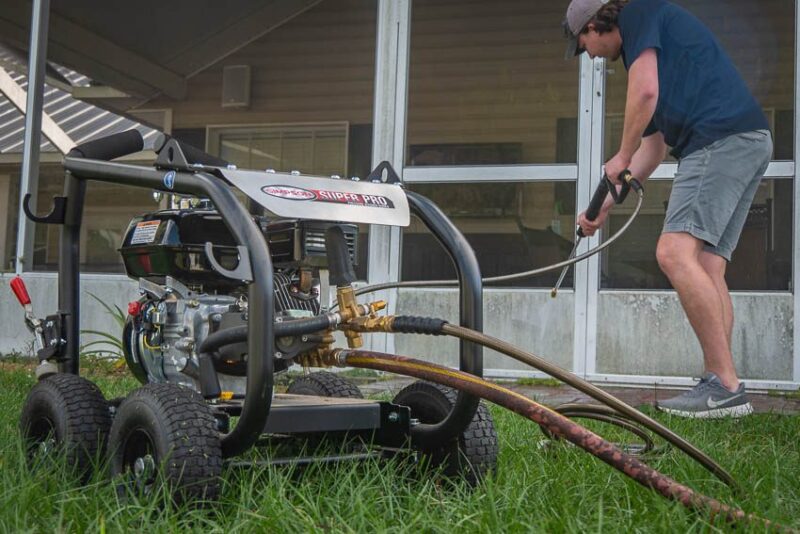
Let’s kick things off with the best gas pressure washer overall, which we think isn’t just one model, but rather, the Simpson SuperPro Roll-Cage series.
First of all, we love that they’re made with global materials right here in the USA. What’s more, we really like what they’ve made.
The 4-wheel, heavy-duty roll cage frame design is just plain rugged. Whether you’re rolling it in and out of your shop or loading and unloading it from a trailer, Simpson SuperPro Roll Cage Pressure Washers are easier to move than traditional 2-wheel designs.
We prefer the Honda-powered models, but there are also Kohler and CRX engine options if you’re interested in checking those out, too. Pressure ratings range from 3000 to 7000 PSI with flow ratings from 2.5 to 8.0 GPM. If you’ll be using it for professional applications, you’re sure to find a PSI/GPM combination that works for you.
CETA-Certified Performance
Price: $949.99 – $5299.99
Best Electric Pressure Washer Overall
Greenworks Commerical 2500 PSI Electric Pressure Washer PW-2500C
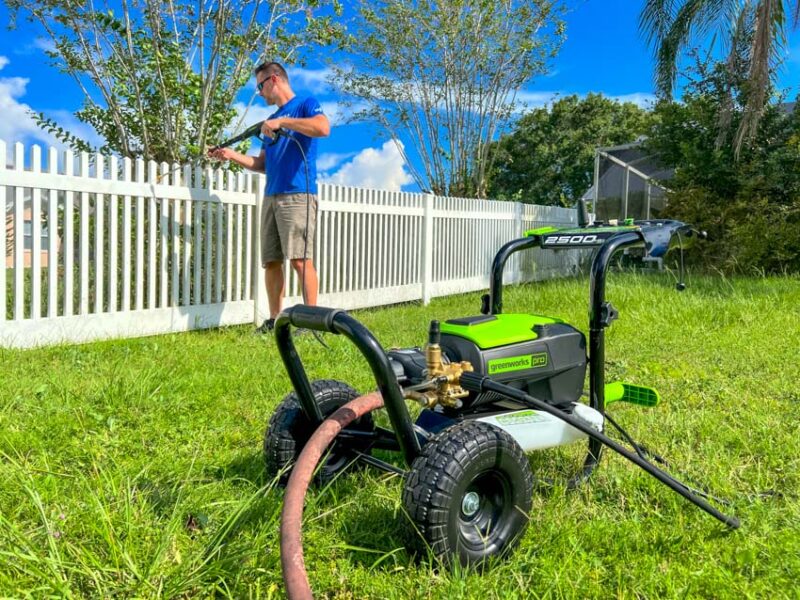
In the realm of electric pressure washers, Greenworks has thrown down the gauntlet, moving into the professional category with its Commercial 2500 PSI Electric Pressure Washer PW-2500C.
As the name suggests, this model is capable of 2500 PSI with 1.2 GPM or 2.1 GPM at 100 PSI–that’s gas-level performance!
Bringing it into the commercial bracket, the PW-2500C uses a 14-amp brushless motor and pairs it with a 1000-hour industrial-grade triplex pump, which gives it service life well beyond residential models. Simply put, we think this one is hard to beat.
PWMA-Certified Performance
Price: $769.99
Want something for residential use instead? Greenworks has a 3000 PSI electric pressure washer for $399.00 .
Don’t miss our Pro tips on How to Use a Pressure Washer!
Best Battery-Powered Pressure Washer
Ryobi 40V HP Brushless Whisper Series 2000 PSI Pressure Washer
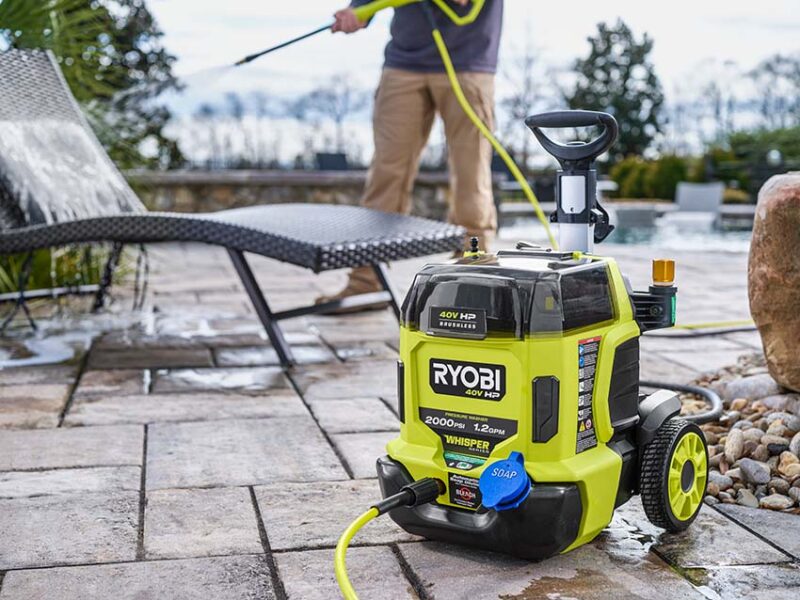
Wow, lithium-ion is powering a pressure washer, and we think it’s about time! The second-generation Ryobi 40V HP Brushless model is the best battery-powered pressure washer in what currently remains a narrow field of competition.
Putting out a whopping 2000 PSI and 1.2 GPM of cleaning power in Boost Mode, it closely resembles the 1500 PSI version we recommended last year. Of course, more power means more fuel, which is why it takes two batteries to run this beast.
One nice feature is that you don’t need a pressurized water source. Drop the siphon hose in the pool or lake and start cleaning.
And since it’s part of Ryobi’s Whisper Series, it runs at a peaceful 57 decibels.
PWMA-Certified Performance
Price: $499.00 without batteries or charger
Best Heavy-Duty Commercial Pressure Washer
Simpson Mobile Trailer 4200 PSI Pressure Washer
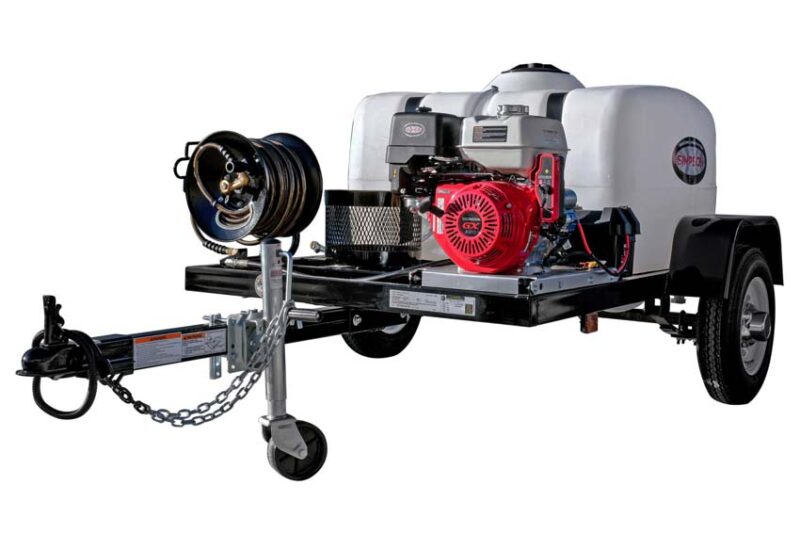
You’re serious about pressure washing if you have this baby in tow. When you’re ready to take your business to the next level, a trailer-mounted model with a water tank lets you work whether there’s a pressurized water source on-site or not. If this sounds right on point, then you should check out Simpson’s 95003 Mobile Trailer unit.
Powered by a Honda GX380 engine working with a CAT triples pump, it produces up to 4200 PSI and 4.0 GPM. In addition to the high level of performance, the engine also includes an electric start.
We think the trailer is a bit on the small side (4 1/2 x 5-foot platform), but it still holds the pressure washer, hose reel, and 150-gallon tank on a certified build.
CETA-Certified Performance
Price: $5499.99
Best Pressure Washer for Home Use
Ryobi 2300 PSI Electric Pressure Washer
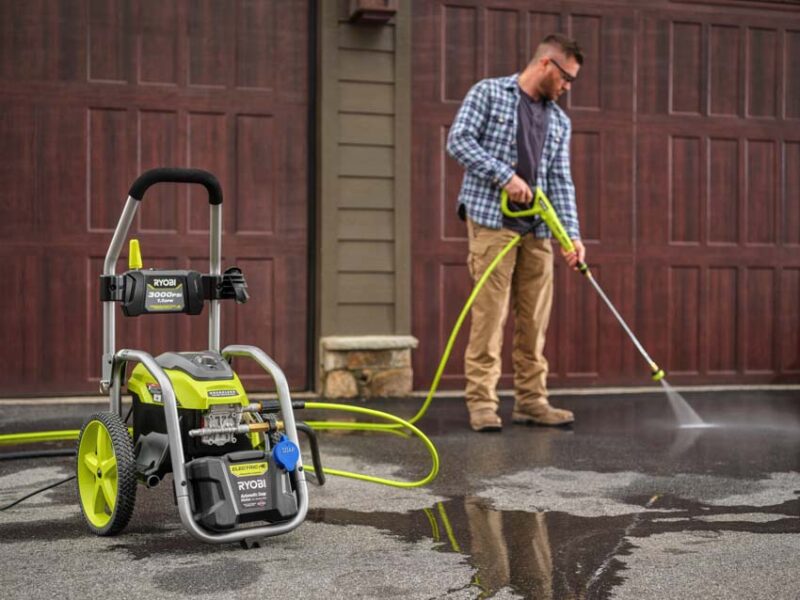
Within the personal home-use arena, battling it out for the best pressure washer usually comes down to a matter of the easy ownership of electric versus the higher power of gas.
Ryobi gives you the best of both worlds with a brushless electric model that legitimately has the power level of gas. It maxes out at an impressive 2,300 PSI and delivers 1.2 GPM at that pressure level.
Like all Ryobi products, it’s available at Home Depot.
PWMA-Certified Performance
Price: $329.00
Best Pressure Washer for Cars
Simpson PS3228 3300 PSI 2.5 GPM Gas Pressure Washer
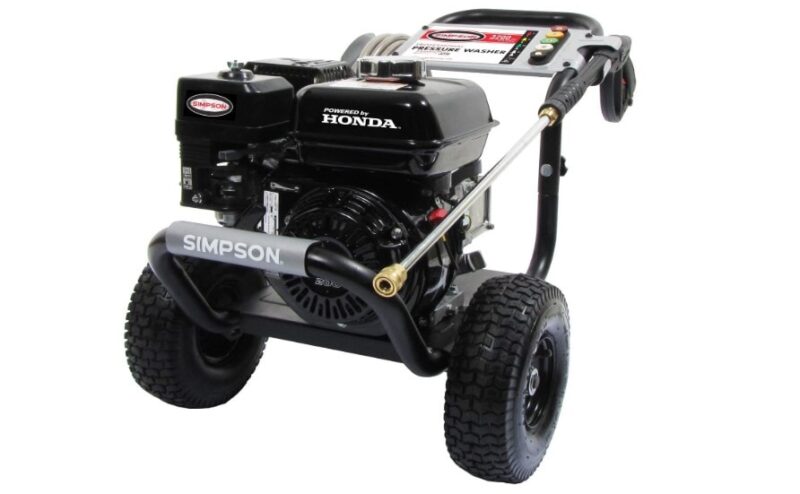
Before we dive into the best pressure washer for cars, please heed the following warning: *Don’t pressure wash your car!*
Most pressure washers have enough power to damage the finish and even dig into the paint. Use your pressure washer with a soap nozzle ONLY to apply soap and rinse the vehicle. Stick to elbow grease and a soft cloth for the actual cleaning.
We recommend pairing a pressure washer with a foam cannon. In the case of the latter, we like the Chemical Guys’ Big Mouth Max Release Foam Cannon.
In terms of settings, we get the best results with at least 3000 PSI and 2.0 GPM.
We chose the Simpson PS3228 as our best pressure washer for cars because its AAA triplex pump and Honda GX200 engine are in it for the long haul. If you use a pressure washer for professional car detailing, this model will stand up to daily use.
For performance, the 3300 PSI and 2.5 GPM numbers hit what we need to get the thickest foam from our cannons. The price is also more manageable than other professional options in the same performance range.
CETA-Certified Performance
Price: $599.00
What About Electric Pressure Washers for Cars?
If all you’re after is basic soap application, electric pressure washers are more than enough. That said, even the most powerful don’t put out the 2.0 GPM minimum we like to see for a foam cannon.
When you want to just soap up your ride and wash some dirt from your wheels, handheld pressure washers provide a nice option and involve much less setup. Although they will require some elbow grease on your part, this type of tool works for homeowners who are big on regular car washings.
Best Portable Pressure Washer
DeWalt 2100 PSI Electric Jobsite Pressure Washer
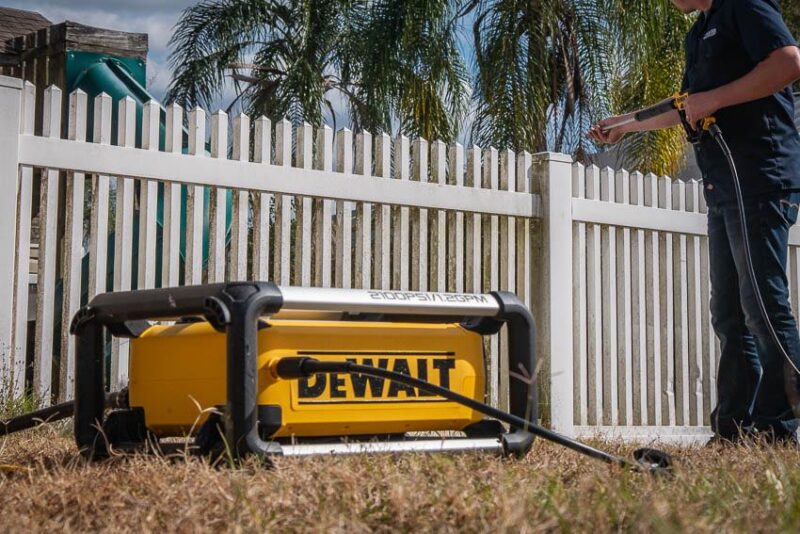
DeWalt definitely caught our attention with a beautifully designed electric pressure washer that balances performance and portability better than others. As for performance, the 2100 PSI Electric Jobsite Pressure Washer gives you 2100 PSI and 1.2 GPM, which is excellent for a small-form model.
The wand and nozzles store inside the housing and the hose tucks into the roll cage. Furthermore, DeWalt includes a telescoping handle and wheels, to make for a rather portable unit.
CETA-Certified Performance
Price: $299.00
Best Pressure Washer for Driveways and Concrete
Simpson SuperPro Roll Cage 3600 PSI 2.5 GPM Gas Pressure Washer
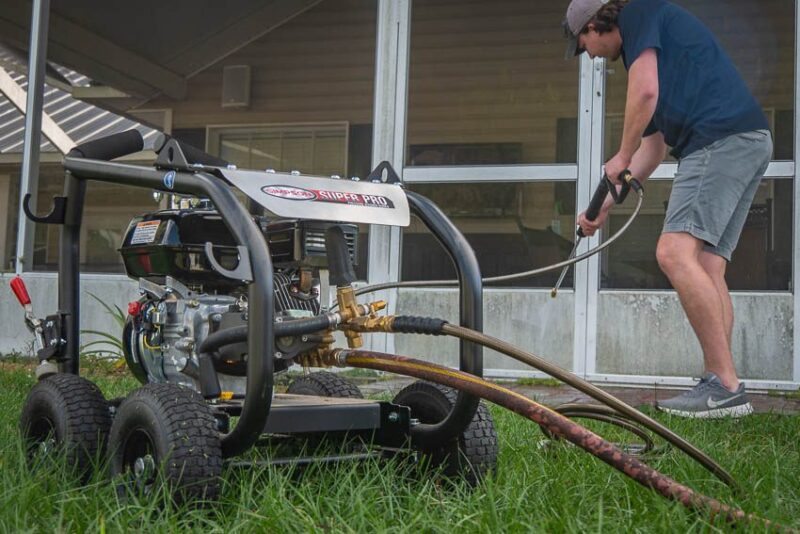
When pressure washing concrete and driveways, you’re working with a combination of mid-to-high-level PSI and generous flow rates. Professionals are looking for a model that can do all of this while remaining easy to roll on and off of the trailer.
Enter the SuperPro Roll Cage series. Our top choice is powered by a dependable Honda GX200 engine and uses a AAA triplex pump to deliver 3600 PSI and 2.5 GPM. Paired with a surface cleaner, you can move through multiple concrete jobs in a day, and better yet, it isn’t a budget buster.
CETA-Certified Performance
Price: $1099.99
Best Pressure Washer for Stripping Paint
Simpson PowerShot 4400 PSI 4.0 GPM Gas Pressure Washer PS60843
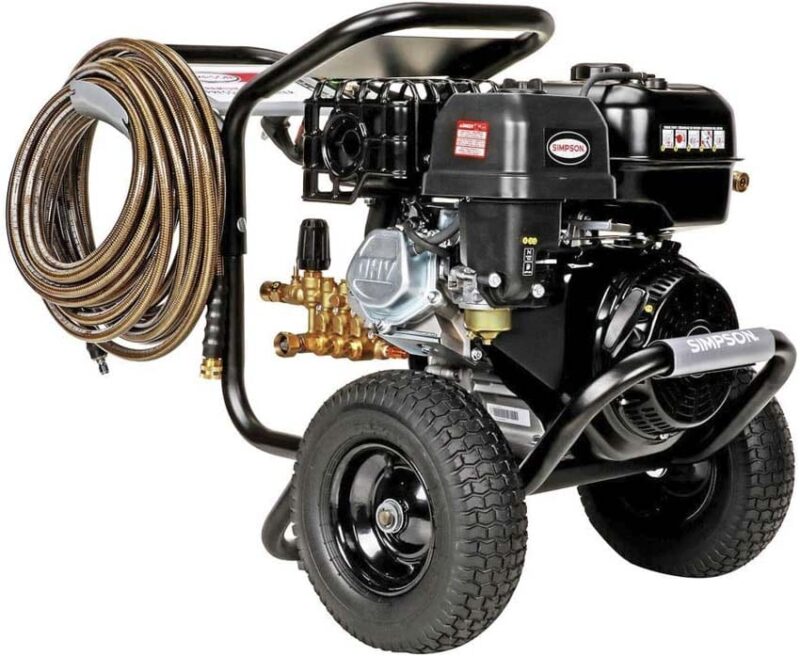
When you turn to the best pressure washer for stripping paint, remember, you’re the one with the brains. Pressure washers can’t tell the difference between the paint you want to remove and what you want to leave behind.
For that reason, these machines are best for removing paint from bare concrete or metal where the underlying finish isn’t as critical. Of course, you can always come back and paint over it.
When it comes to removing paint, we suggest a minimum of 4000 PSI and, naturally, by way of a commercial solution.
The Simpson PowerShot PS60843 is our choice.
With 4400 PSI and 4.0 GPM coming from its Simpson 420cc engine and AAA triplex pump, this model is a pro at stripping paint. It has a commercial-level build quality but at a surprisingly reasonable $899–several hundred dollars less than much of its competition.
CETA-Certified Performance
Price: $899.99 at Home Depot
Best Pressure Washer for the Money
Simpson Pressure Washers
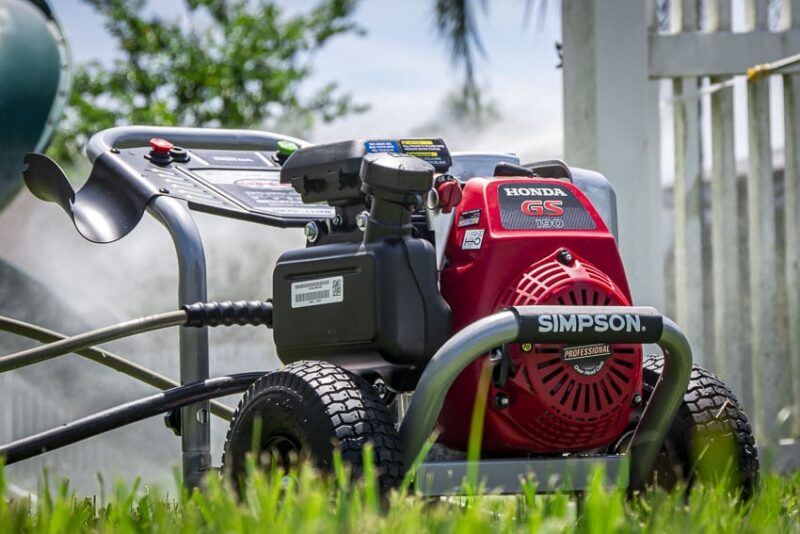
Based on our experience, Simpson is definitely a stand-out brand, consistently delivering pressure washers with higher-quality parts and prices. It’s not uncommon to get a Honda engine at the same price or lower than other brands charge for an OEM engine.
What’s more, they seem to have a solution for every task.
CETA-Certified Performance
Best Pressure Washer Surface Cleaner
Simpson 20-Inch Industrial Surface Cleaner
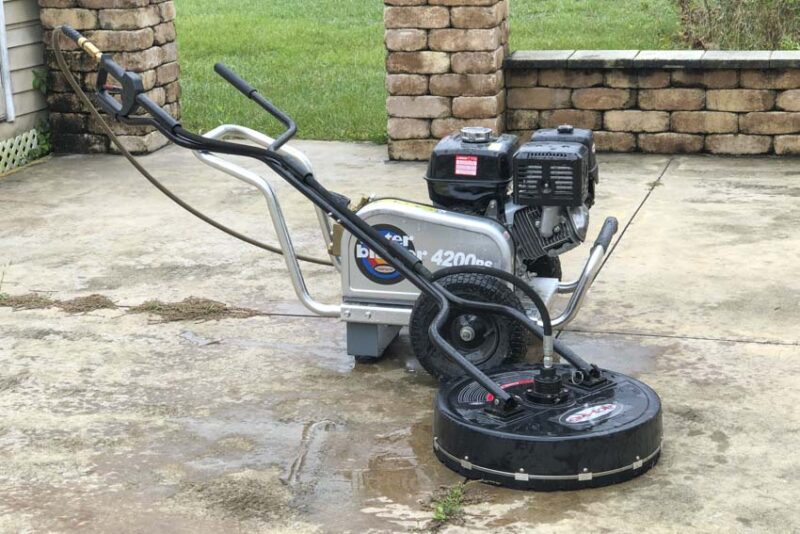
If you’ve ever pressure washed your driveway with a 25º nozzle, you’re in for a treat with the Simpson 20-Inch Industrial Surface Cleaner. We’re talking night and day here.
A surface cleaner takes the work from your pressure washer and directs it into a spinning nozzle that cleans a wide area. Each one has a PSI rating that you need to pay attention to and not overpower. For the easiest cleaning on larger models, look for one that has casters.
Simpson’s 20-inch diameter and sturdy build will help you power through big jobs.
The downside? It’s significantly more expensive than its homeowner equivalent, Simpson’s $79.99 15-inch surface cleaner.
Price: $449.99
Best Pressure Washer Soap and Detergents
When using soap and detergents in your outdoor cleaning jobs, we strongly recommend going with products that are made specifically for pressure washers. You’ll extend the life of your accessories and connectors, and you’ll get your cleaning done faster than you would using only water. It’s a win-win.
Best Vinyl Siding Cleaner for Pressure Washers
Simple Green Oxy Solve House and Siding Cleaner
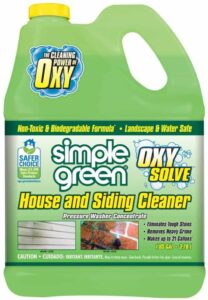
No matter where you live, siding can be a real pain to keep clean. And, in our opinion, the best vinyl siding cleaner for pressure washers is Simple Green’s Oxy Solve House and Siding Cleaner.
It’s pre-concentrated for pressure washers and is non-toxic and biodegradable. It also uses peroxide to bring back your siding color without using bleach.
Price: $19.99/gallon
We Also Recommend:
- Rust-Oleum Krud Kutter House and Siding Pressure Washer Concentrate: $14.99 /gallon on Amazon
- Zep House and Siding Pressure Washer Concentrate: $39.99 /4 gallons on Amazon
Best Concrete Cleaner for Pressure Washers
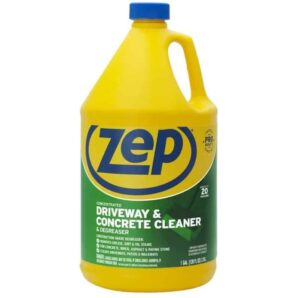
ZEP Driveway, Concrete, and Masonry Cleaner Concentrate
ZEP’s Driveway, Concrete, and Masonry Cleaner is great for deep surface cleaning, including heavy stains like oil, grease, and tire marks.
While it isn’t as environmentally friendly as Simple Green, it does pack a powerful punch.
Price: $14.98/gallon
We Also Recommend:
- Rust-Oleum Krud Kutter Concrete and Driveway Pressure Washer Concentrate: $15.98/gallon at Lowe’s
- Simple Green Concrete and Driveway Cleaner – Pressure Washer Concentrate: $23.99/gallon at Amazon
Best Car Soap for Pressure Washers
Chemical Guys Maxi Suds 2 High Foam Maintenance Shampoo and Gloss Booster
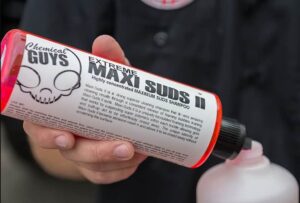
In our view, the Chemical Guys is a trusted name in car cleaning, which is why we’ve selected their Maxi Suds II High Foam formula as the best car soap for pressure washers.
It foams up very well in spite of built-up dirt and grease, lifting them off the surface so you can easily wipe them away for a scratch- and swirl-free finish.
Price: $22.99/gallon
We Also Recommend:
- Karcher Car Wash & Wax Soap for Pressure Washers: $10.98 /quart on Amazon
Pressure Washer Buying Guide
Pressure Washer vs Power Washer: Aren’t They the Same?
We find similarities between pressure washers and power washers, but they aren’t the same. If fact, there’s one major difference: Power washers have a heating element and pressure washers don’t.
This single feature can make a difference in a washer’s ability to blast away stubborn messes like oil and grease. They’re also more expensive and require more maintenance, which is why many Pros and homeowners use pressure washers with chemical detergents.
PSI vs GPM
Every pressure washer and power washer comes with two numbers: A PSI rating and a GPM rating. PSI, or pounds per square inch, is usually what gets the most attention, but they’re both important.
PSI represents the maximum force with which the water will hit the surface. Higher pressure means more force and, therefore, more cleaning power.
The pressure is highest with your 0º tip and reduces as the angle widens.
GPM (gallons per minute) is a measure of the maximum water flow. More water flow means more water is hitting the surface.
This removes material more quickly. Some models have a flow control valve on the pump if you want to reduce water flow.
Calculating a Pressure Washer’s Power
One way to compare one pressure washer’s power to another is simply to multiply the two values together. Here’s an example:
| Pressure | Flow | Cleaning Power | |
|---|---|---|---|
| Model A | 3000 PSI | 2.2 GPM | 6,600 |
| Model B | 3100 PSI | 2.1 GPM | 6,510 |
| Model C | 2800 PSI | 2.3 GPM | 6,440 |
Even though Model A didn’t have the highest PSI or GPM rating, it actually has the most overall cleaning power.
How Much Pressure Washer Power Do You Need?
The best way to determine the amount of power you need is to anticipate what you might want to clean with your pressure washer. Here’s a breakdown of PSI strengths paired with common tasks.
Under 500 PSI
- Washing vehicles
- Patio furniture (including wicker)
- Screens
Under 2000 PSI
- Shutters
- Grills
- Patio/lawn furniture
- Screens
- Lighter mildew/mold
- Limited cleaning on concrete/asphalt
2000 – 3000 PSI
- Decks
- Fences
- Pavement
- Concrete (driveways and sidewalks)
- Cleaning with smaller surface cleaner attachments
- Siding
- Stains
- Lighter mildew/mold
3000 – 4000 PSI
- Concrete (driveways and sidewalks)
- Cleaning with larger surface cleaner attachments
- Pavement
- Siding
- Fences
- Decks
- Deeper stains
- Mildew/mold
- Paint prep
- Paint stripping/graffiti removal (at the top of the range)
4000+ PSI
- Paint stripping/graffiti removal
- Concrete (driveways and sidewalks)
- Cleaning with the largest surface cleaner attachments
- Pavement
- Siding
- Fences
- Decks
- Deeper stains
- Mildew/mold
- Paint prep
Gas, Electric, or Battery?
When deciding what form of power you’ll be using, there are some significant trade-offs that will inevitably factor into your consideration.
Electric pressure washers are ideal for homeowners thanks to their low-maintenance designs. They also run quieter and with fewer emissions.
The drawback is that they’re limited in power and water flow.
If you’re buying an electric pressure washer, consider one that has GFCI built-in. If you decide on one that doesn’t have this feature, make sure you plug into an outlet that does.
Gas pressure washers are loud, require more maintenance, and have smelly gas emissions. But, generally speaking, electric motors don’t give you the pressure and water flow that you’ll get out of a gas engine. Electric pressure washers usually max out in the mid-2000 PSI range.
Meanwhile, battery power has its own set of considerations.
Currently, Greenworks has the only battery-powered pressure washer on the market with pressure worth writing home about, though there are a few pressure washers in the 300–450 PSI range. Not surprisingly, the main trade-off is runtime.
Commercial or Residential?
When we differentiate between commercial and residential, we’re really talking about the difference between commercial and residential gas pressure washers. It boils down to two major components: The engine and the pump.
Logically, commercial pressure washers use commercial-grade engines like the Honda GX series, whereas residential models use lighter-duty engines like the Honda GC series.
Then there’s the pump.
The best pressure washer pump is a triplex pump on pressure washers for professional use and an axial cam pump on residential models.
Furthermore, if you’re going to be using your pressure washer for commercial applications, consider an engine with EFI—electronic fuel injection. It’ll give you an easier start and better fuel economy.
Buyer Beware: PSI Max* (Buy a Certified Pressure Washer Instead)
There are pressure washers on the market, primarily from the Snow Joe brand, Sun Joe, that uses “PSI Max” in their boldest product packaging and product webpages. But somewhere in smaller print, you’ll find the “working pressure” or “rated pressure,” and it’s much less.
Sun Joe’s 3000 PSI Max/1.30 GPM system sounds like an amazingly high power for an electric model, but the actual working specs are 2300 PSI and 1.1 GPM. That “Max” pressure is over 30% higher than its actual working pressure.
The rationale is that the pressure washer really does hit those numbers momentarily, and it’s important for consumers to know to avoid damage or injury.
The best way to avoid confusion is by purchasing a pressure washer certified by either the PWMA or CETA. To learn more, check out our article on pressure washer PSI max.
Read more about the Better Business Bureau’s NAD decision to allow PSI Max* advertising based on consumer relevancy here .
Pressure Washer Nozzles
A lot of pressure washers come with 0º, 15º, 25º, 40º, and soap nozzles, which covers the majority of applications. They’re usually color-coded with a reference key printed on the frame. The angle should also be marked on the nozzle itself.
Nozzles are fairly inexpensive if you need to replace them. However, they have a PSI rating.
This is important.
Make sure you don’t buy one rated for less than what your pressure washer delivers. Most are a 1/4-inch QC (quick connect) and are compatible with the majority of pressure washer wand connections.
Pressure Washer Hoses
The hose that comes with your pressure washer is going to be paired intentionally by the manufacturer. Like the nozzles, they’re rated for a particular PSI.
When looking for a replacement hose, use that rating as a guide and get as close as you can to what your model has.
You don’t want to put more pressure through a hose than it can handle. Moreover, getting a hose that’s rated for a lot more pressure than your pressure washer produces can reduce your performance.
Your best bet is to check your manual to see what hose diameter and length are appropriate for your exact model.
Pressure Washer Wands
Pressure washer wands are inherently vulnerable because they’re tubes by nature and need to be light enough for you to effectively manipulate them. However, an unfortunate offshoot here is that they’re prone to bending, pinching, or flat-out breaking off if you accidentally step on them.
The best way to avoid damage is to hang the wand off the ground when you’re not using it. What’s more, try to avoid leaning it against the wall or trailer.
When you do need to replace it, you must heed the PSI rating. So, stick with the same diameter tube and quick connect nozzles (most are a 1/4-inch tube with 1/4-inch QC), and you shouldn’t have any problems.
Lastly, you need to take note of the connection to your spray gun. Make sure your threads match. Most are M22 connections, and you can always double-check your manual to be sure.
On a Well for Your Water Supply?
Most pressure washers need a pressurized water supply, even though the pump and the engine take it to another level. Water coming from well pumps often lacks adequate pressure, which might affect how it works with some pressure washers. Consult your manual to be sure, and, if it’s unclear, email the manufacturer.
We know these articles are pretty long, however, there are a lot of relevant topics and scenarios. Judging by the length, you may not be able to tell here, but there are actually things we had to leave out for the sake of time and space.
Why You Can Trust OPE Reviews
Ever check out a “review” site, and you can’t tell if they actually tested the tools or if they’re just “recommending” the Amazon top sellers?
That’s not us. We only recommend what we’d actually use, even if we don’t earn a commission from it. It’s all about giving you a legitimate recommendation and our honest opinion of each product, which includes the best trimmers and edgers.
We’re an online publication dedicated exclusively to covering outdoor power tools, top-notch equipment reviews, and industry news in technical machine operation, how-to guides, and Pro and residential landscaping and yard maintenance.
Our Pro reviewers have the skills and experience to know whether a product can perform well in the field.
This includes tractors and mowers, string trimmers and edgers, blowers, chainsaws, hedge trimmers, engines, heavy equipment, aerators, hand tools, generators, maintenance gear, workwear, safety products, and more.
The OPE team will put its hands on hundreds of additional tools at media events and trade shows throughout the year. This also includes behind-the-scenes tours of manufacturing plants and test facilities.
The OPE staff consults innovators in the technology and design of outdoor tools to gain a broader grasp of where these products fit and how they work.
And this wealth of knowledge and experience is absolutely free.
The end result is information you can trust because of the editorial, scientific, and real-world professional know-how we collectively utilize each and every time we pick up and test outdoor power equipment or research a topic.

